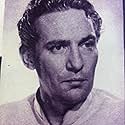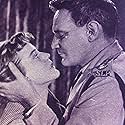Adicionar um enredo no seu idiomaAn unhappily married British security officer stationed in Sierra Leone during World War II falls in love with a young Austrian woman and starts an affair. He soon starts feeling guilty.An unhappily married British security officer stationed in Sierra Leone during World War II falls in love with a young Austrian woman and starts an affair. He soon starts feeling guilty.An unhappily married British security officer stationed in Sierra Leone during World War II falls in love with a young Austrian woman and starts an affair. He soon starts feeling guilty.
- Direção
- Roteiristas
- Artistas
- Indicado para 4 prêmios BAFTA
- 1 vitória e 5 indicações no total
Gérard Oury
- Yusef
- (as Gerard Oury)
Jack Allen
- RNVR Lieutenant
- (não creditado)
Peter Burton
- Perrot
- (não creditado)
Earl Cameron
- Ali
- (não creditado)
Saidu Fofana
- African Policeman
- (não creditado)
Judith Furse
- Dr. Sykes
- (não creditado)
John Glyn-Jones
- Harris
- (não creditado)
Colin Gordon
- Colonial Secretary
- (não creditado)
Jane Henderson
- Miss Malcot
- (não creditado)
Errol John
- African Policeman
- (não creditado)
- Direção
- Roteiristas
- Elenco e equipe completos
- Produção, bilheteria e muito mais no IMDbPro
Avaliações em destaque
A fairly good remake of the Graham Greene novel. Though the ending is different from the novel, the tragic theme is prevalent throughout the film. Trevor Howard brings out Scobie's inner torment credibly - as the principled police officer scared of the misery around him. The colonial aspects of the time period are handled well, you can almost feel the heat and humidity and the occasional fevers that rack the body. This combined with good acting, flesh out the Greene novel faithfully. A terrific movie about the machinations of the human conscience, and what it can lead to.
Trevor Howard is a policeman who tries to get to "The Heart of the Matter" in this 1953 film based on the Graham Greene novel. It also stars Elizabeth Allan and Maria Schell. Howard plays Harry Scobie, a police officer in Sierra Leone. He and his wife have lost their young daughter, and now his wife is miserable in Sierra Leone. In order to get money for a trip for her, Scobie borrows money from an unsavory character - later on, this will lead to problems for him with his superiors. He meets a stranded widow, Helen (Schell), and the two fall in love. When his wife returns, he is faced with a religious dilemma. She is told he has been fooling around. She wants him to go to church with her and take Communion - meaning, of course, that he would have confessed his adulterous sin to the local priest. In fact, the priest comes to the house. The priest cannot accept his confession, because Scobie doesn't believe he can stop seeing Helen. In order to hide this from his wife, he commits the mortal sin of going to communion not in the state of grace.
Stripped down to the religious elements of this film, "The Heart of the Matter" doesn't sound like much. But it has a very high resonance if you're Catholic, suicide is the unforgivable sin, you can't go to communion unless you've been to confession, etc.
Trevor Howard gives a very profound performance as a man who has lost everything except his religion and who describes hell as eternal wanting. As a man who lost sight long ago of what he wants, he lives in a private hell that the surrounding locations only emphasize.
A slow, pessimistic film, a great performance, well worth seeing if you're on antidepressants.
Stripped down to the religious elements of this film, "The Heart of the Matter" doesn't sound like much. But it has a very high resonance if you're Catholic, suicide is the unforgivable sin, you can't go to communion unless you've been to confession, etc.
Trevor Howard gives a very profound performance as a man who has lost everything except his religion and who describes hell as eternal wanting. As a man who lost sight long ago of what he wants, he lives in a private hell that the surrounding locations only emphasize.
A slow, pessimistic film, a great performance, well worth seeing if you're on antidepressants.
Trevor Howard makes the dilemmas facing his character unforgettable. I saw this movie decades ago, and there are scenes - some sensational, some very quiet - that still haunt me. I hope I have the chance to see the movie again - I'd like to share it with my daughter and discuss the theological issues raised with her - and of course, celebrate Howard's marvelous acting.
Adapted from one of Graham Greene's "Big 4" "Catholic novels", The Heart of the Matter is notable for its excellent production standards. In an example of literacy audiences differing from those of the cinema, the film is generally accepted as being a commercial failure, I would suggest due to its rather bleak and depressing storyline.
The acting is first class with Trevor Howard excelling as Scobie, the principled expatriate Catholic police officer serving in Sierra Leone. Enmeshed in a loveless marriage with an adulterous wife, he still attempts to do the right thing by all parties, including his wife's smarmy lover Wilson (a fine young Denholm Elliot), as well as do his job professionally, though aware he is to be passed over for promotion for a younger officer. Both his faith and desires however are tested mightily after meeting the young refugee Helen.
The black and white cinematography shot by the great Jack Hildyard on location in Sierra Leone is superb, as is the indigenous, largely percussive soundtrack.
The storyline does parallel much of Greene's life, as he served in Sierra Leone during World War 2, not for the police, but the nascent MI6. The self-confessed "Catholic agnostic", in creating the character of Harry Scobie, forms a template mirroring his own inner torments and depressions, whilst trying to adjust his life to established institutions such as lasting marriage to one person and living one's life according to Catholic doctrines.
Though quite a literal and respectable adaption from Greene's book, this is also arguably the root reason for the film's failure to win much of an audience, apart from those with a fair awareness and interest in Catholicism. Unlike some of Greene's other work embracing aspects of espionage mystery and suspense, this film pretty much eschews any thought of embellishing the story with a police procedural. It serves almost solely as a psychological examination of Scobie's inner demons and challenges. Both the narrative and its conclusion can best be described as unrelentingly harsh and cheerless.
Unsurprisingly, as such, it was never a film likely to gather a large audience, despite its its many production virtues.
The acting is first class with Trevor Howard excelling as Scobie, the principled expatriate Catholic police officer serving in Sierra Leone. Enmeshed in a loveless marriage with an adulterous wife, he still attempts to do the right thing by all parties, including his wife's smarmy lover Wilson (a fine young Denholm Elliot), as well as do his job professionally, though aware he is to be passed over for promotion for a younger officer. Both his faith and desires however are tested mightily after meeting the young refugee Helen.
The black and white cinematography shot by the great Jack Hildyard on location in Sierra Leone is superb, as is the indigenous, largely percussive soundtrack.
The storyline does parallel much of Greene's life, as he served in Sierra Leone during World War 2, not for the police, but the nascent MI6. The self-confessed "Catholic agnostic", in creating the character of Harry Scobie, forms a template mirroring his own inner torments and depressions, whilst trying to adjust his life to established institutions such as lasting marriage to one person and living one's life according to Catholic doctrines.
Though quite a literal and respectable adaption from Greene's book, this is also arguably the root reason for the film's failure to win much of an audience, apart from those with a fair awareness and interest in Catholicism. Unlike some of Greene's other work embracing aspects of espionage mystery and suspense, this film pretty much eschews any thought of embellishing the story with a police procedural. It serves almost solely as a psychological examination of Scobie's inner demons and challenges. Both the narrative and its conclusion can best be described as unrelentingly harsh and cheerless.
Unsurprisingly, as such, it was never a film likely to gather a large audience, despite its its many production virtues.
While this might not offer much appeal to movie buffs hooked on action flicks - any that value truly classic writing (Graham Green) will be more than compensated by this in-depth character study of the eternal triangle - as examined through the eyes of Catholic guilt and dedication to specific vows and doctrine. Trevor Howard is absolutely superb as Scobie, the trapped in a loveless marriage, deputy commissioner of the Sierra Leone police in the early 40s. With the arrival of survivors from a torpedoed ship, Scobie finds himself drawn to a vulnerable young woman. Lovely Award-winning Austrian-Swiss born, Maria Schell is his equal in her performance of the young survivor.
Beautifully photographed on location, in B/W by Award-winner Jack Hildyard (Bridge on the River Kwai) and reasonably directed by highly regarded TV man, George More O'Ferrall - this richly detailed soul-searching drama is filled with wonderfully defined characters, well played by a sterling international cast.
Not to be missed by all who value classic storytelling and solid British movie-making. The newly restored DVD transfers make it a valuable re-discovery.
Beautifully photographed on location, in B/W by Award-winner Jack Hildyard (Bridge on the River Kwai) and reasonably directed by highly regarded TV man, George More O'Ferrall - this richly detailed soul-searching drama is filled with wonderfully defined characters, well played by a sterling international cast.
Not to be missed by all who value classic storytelling and solid British movie-making. The newly restored DVD transfers make it a valuable re-discovery.
Você sabia?
- CuriosidadesThe novel from which this movie was adapted, drew upon author Graham Greene's wartime experiences in Sierra Leone, where he was employed by Britain's Secret Intelligence Service (MI6).
- Citações
Harry Scobie: Besides, I like the place.
Commissioner: I believe you do. I wonder why.
- Cenas durante ou pós-créditosOpening credits prologue: FREETOWN, 1942.
- ConexõesFeatured in Dangerous Edge: A Life of Graham Greene (2013)
Principais escolhas
Faça login para avaliar e ver a lista de recomendações personalizadas
Detalhes
- Data de lançamento
- País de origem
- Idioma
- Também conhecido como
- Das Herz aller Dinge
- Locações de filme
- Serra Leoa(made in Sierra Leone, West Africa)
- Empresas de produção
- Consulte mais créditos da empresa na IMDbPro
- Tempo de duração
- 1 h 45 min(105 min)
- Cor
- Proporção
- 1.37 : 1
Contribua para esta página
Sugerir uma alteração ou adicionar conteúdo ausente





























